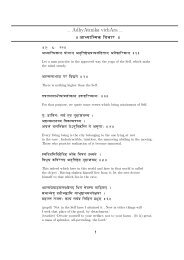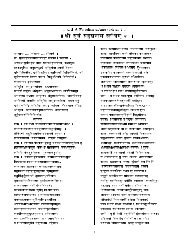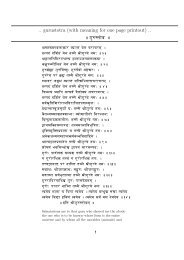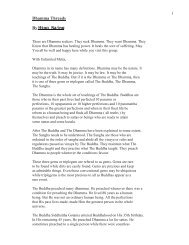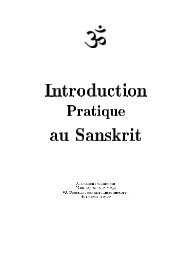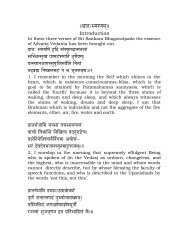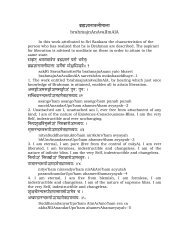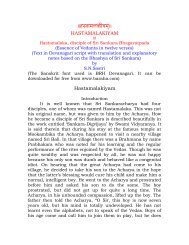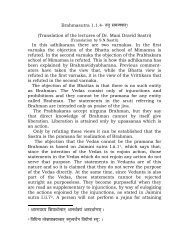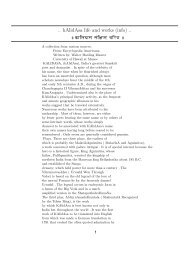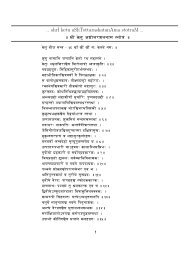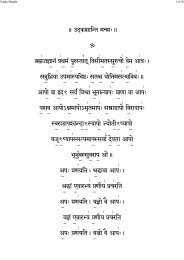16 names of Lord SubrahmaNya - Sanskrit Documents
16 names of Lord SubrahmaNya - Sanskrit Documents
16 names of Lord SubrahmaNya - Sanskrit Documents
You also want an ePaper? Increase the reach of your titles
YUMPU automatically turns print PDFs into web optimized ePapers that Google loves.
.. <strong>16</strong> <strong>names</strong> <strong>of</strong> <strong>Lord</strong> <strong>SubrahmaNya</strong> ..<br />
॥ш॥<br />
шк।<br />
шк॥1॥<br />
кккхкк।<br />
шк॥2॥<br />
шхe।<br />
eш।<br />
॥3॥<br />
COMMENTS:<br />
In the following comments some abbreviations are used. They are -<br />
(1) VS - Vishnu sahasranama. (2) SS - Siva sahasranama (Padma Purana).<br />
(3) BG - Bhagavad Giata (4) BH - Shrimad Bhagavatam<br />
(5) LS - Lalita sahasranamam.<br />
Our religion lays great emphasis on the purificatory power <strong>of</strong> the <strong>Lord</strong>’s name.<br />
Our vedas talk about this. The following verse from the Yajur Veda will serve<br />
as an instance.<br />
aшш ।<br />
к ॥<br />
This prayer addressed to <strong>Lord</strong> Vishnu says ”I specially extol Your name”.<br />
Swami Bodhendra, who was a great advocate <strong>of</strong> chanting <strong>of</strong> the <strong>Lord</strong>’s name<br />
points out that шindicates repeating the name several times.<br />
The vedas themselves contain many hymns that extol the <strong>Lord</strong>. Shri Rudram,<br />
Shrisuktam etc., give the <strong>names</strong> <strong>of</strong> the <strong>Lord</strong>. The puranas also contain many<br />
compilation <strong>of</strong> <strong>names</strong> (nAmAvali) which are very suitable for recitation. Among<br />
these the Vishnu sahasranamam, Shiva sahasranamam and Lalita sahasranAmam<br />
are popular. Their recitation with devotion is guaranteed to confer<br />
immense benefits to the person. The Vishnu sahasranamam has the following<br />
verse towards the end. This says that the one who listens to it or recites it<br />
daily will not encounter misfortunes in this life or the life hereafter.<br />
iшк ।<br />
ш к ॥<br />
Similarly the Kaivalyopanishad says that one who recites Shri Rudram is<br />
absolved from great sins.<br />
ш ।।<br />
।кк।<br />
Sage Naradha told sage Vyasa (BH 1-5-22) that wise men declare that the abiding<br />
1
purpose <strong>of</strong> man’s austere penance, sacred knowledge, sacrificial performances,<br />
recitation <strong>of</strong> the Vedas with correct intonation, enlightenment and <strong>of</strong>fering<br />
<strong>of</strong> gifts is to recount the virtues <strong>of</strong> the <strong>Lord</strong>.<br />
i।<br />
aкк- ॥<br />
In view <strong>of</strong> such statements many have the habit <strong>of</strong> reciting these hymns<br />
daily after completing their worship. But in these days, when time has<br />
become a scarce commodity, many have given up performing daily puja and<br />
even sandhyavandanam. For the benefit <strong>of</strong> such people, our kindly sages have<br />
provided shorter version <strong>of</strong> the hymns. In addition to sahasranamas that<br />
contain 1000 <strong>names</strong>, they have given us trishatis that contain 300 <strong>names</strong>,<br />
ashtottarashatams that list 108 <strong>names</strong> and even lists containing <strong>16</strong> and<br />
12 <strong>names</strong>. If someone was to claim that he has not the time even to say<br />
these abridged versions, our puranas suggest repeating any <strong>of</strong> <strong>Lord</strong>’s <strong>names</strong><br />
that one prefers. Towards the end <strong>of</strong> the Vishnu sahasranama stotram, there<br />
is a verse in which Parvati asks <strong>Lord</strong> Shiva if there is an easy method to<br />
recite the lengthy sahasranamam. In reply <strong>Lord</strong> Shiva says that repeating<br />
the name Rama is equivalent to reciting the entire sahasranamam!<br />
-<br />
кк ।<br />
॥<br />
и -<br />
।<br />
॥<br />
The stotram that is given herein contains sixteen <strong>names</strong> <strong>of</strong> <strong>Lord</strong><br />
Subrahmanya who is a very popular deity worshipped in the country. The<br />
last verse says that one who recites these <strong>names</strong> daily will be absolved from<br />
all sins. So, the <strong>Lord</strong> has the name ш -к<br />
шш।VS(992). Reciting a short<br />
poem that contains few <strong>names</strong> looks very easy and because <strong>of</strong> this reason<br />
one may entertain some doubt if repeating few <strong>names</strong> can free one from<br />
sins. Shrimad Bhagavatam gives the example <strong>of</strong> one taking a medicine. A<br />
tablet may weigh only few milligrams, but it can work even in the body<br />
<strong>of</strong> a burly person and can give great relief. Also a medicine will do its<br />
work even one takes it by mistake! (Eg.) a laxative tablet even when<br />
swallowed by mistake will make the person run to the toilet within a<br />
short time. Similarly, the <strong>Lord</strong>’s <strong>names</strong> will purify a person in whatever<br />
manner it is uttered. The Padma Purana says this as follows.<br />
a шк ।<br />
॥<br />
That is why in the introduction to Vishnu shasranama stotram Shri Bhishma<br />
says that worshipping the <strong>Lord</strong> by reciting hymns (stotras) is the best<br />
and easiest form <strong>of</strong> worship by which one can get over the problem<br />
2
<strong>of</strong> samsara or cyclic births.<br />
e к।<br />
к॥<br />
We should note an important point here. The stotras may be named after<br />
different forms <strong>of</strong> gods such as Vishnu or Shiva or Lalita Devi etc.<br />
But when we go through the <strong>names</strong> we find that there are some<br />
that clearly say that the god that is praised is the Supreme Being. So,<br />
there is no question <strong>of</strong> one being superior or inferior to the others.<br />
They all are in praise <strong>of</strong> one and the same Being.<br />
Where is the Supreme Being and how to worship it - one may wonder.<br />
It is everywhere and every thing according to the scriptures.<br />
-।-----к-<br />
-॥<br />
“ ”i।SS(802)<br />
We find the name in the Vishnu sahasranama (25) also. For the convenience<br />
<strong>of</strong> those who want to worship the <strong>Lord</strong>, He has assumed various forms such<br />
as Rama, Krishna, Shiva, Devi etc. We may worship Him in anything as He<br />
is every thing. So, we have the habit <strong>of</strong> worshipping Ashwattha tree,<br />
rivers like Ganga, books like the Gita or Ramayana and so on. But for the<br />
sake <strong>of</strong> convenience we have the practice <strong>of</strong> worshipping Him in idols,<br />
shaligrama and lingam. It is known that the mind is wavering by nature<br />
and so is difficult to concentrate for a long time during the<br />
worship. This kind <strong>of</strong> worship is easy and most suitable for<br />
those who require an external object to help them to focus<br />
their mind during the worship. After proper installation<br />
with mantras the idol is no more an inanimate idol, but<br />
the living prescence <strong>of</strong> the <strong>Lord</strong>. As the worship <strong>of</strong> the <strong>Lord</strong> in such a<br />
consecrated idol has to be done with great deal <strong>of</strong> devotion the external<br />
object helps in paying attention to the <strong>Lord</strong> in the object. So, one<br />
may say that it is most suited during the early stages <strong>of</strong> worship for<br />
one whose mind is not steady. But as one continues with the worship he<br />
progresses steadily on the spiritual path. Devotion swells in the heart<br />
and the <strong>Lord</strong> slowly creeps into his mind. The mind is gradually purged<br />
<strong>of</strong> undesirable traits such as likes, dislikes, anger, lust that pollute<br />
and distract the mind. In such a mind that is pure and steady the Self<br />
within reveals Itself. Such a devotee who has made great progress on the<br />
spiritual path may worship the <strong>Lord</strong> within himself - in the space (called<br />
‘cave’ or ). The Katha upanishad (1-2-20)says this as follows.<br />
a a ।<br />
шк॥<br />
For this reason, <strong>Lord</strong> Subrahmanya is also known as Guha ( ।). SS(865).<br />
к,।,<br />
ш।<br />
3
“”। “ <br />
к”i॥<br />
Devi Lalita also has the name Guhya ( -॥)<br />
LS(624)<br />
Sage Vishvamitra narrates the story <strong>of</strong> the birth <strong>of</strong> Subrahmanya to Shri<br />
Rama and Laxmana as he is taking them through the forests. In the end, he<br />
gives the benefits that will accrue to one who listens to the story and<br />
says that if one is devoted to <strong>Lord</strong> Subrahmanya he will have longevity<br />
and an abode in the divine world <strong>of</strong> Skanda along with his sons and<br />
grandsons. (Balakanda-37-32).<br />
кк кк।<br />
a к ॥<br />
The late Paramacharya <strong>of</strong> Kanchi math pointed out that the name swami<br />
( ) occuring in the third verse is unique to <strong>Lord</strong> Subrahmanya and<br />
identifies Him with the Supreme Being. He quotes the verse from Amarakosha<br />
in support. шх।The word swami<br />
( ) means the owner. What does the <strong>Lord</strong> own? He owns the entire<br />
universe and so is the Supreme Being. The name Subrahmanya may be split<br />
as su ( ) and brahmanya ( ). Brahmanya means protector<br />
<strong>of</strong> dharma. The name appears in the Vishnu and Siva sahasranamas. The<br />
commentators Shankaracharya define the word as follows. -<br />
“ ।”<br />
।VS (661). Tapas or austerities, the vedas,<br />
those who study and abide by the vedic injunctions and have got the<br />
knowledge <strong>of</strong> the Self, and the spiritual wisdom are known as brahma<br />
(not the creator Brahma). The <strong>Lord</strong> supports them. The name is defined<br />
similarly in SS(562).<br />
к।<br />
“a ।”i।<br />
।(Gita-7-18)<br />
We find from the Skanda Purana that <strong>Lord</strong> Subrahmanya incarnated to quell<br />
the asuras and bring the dharma back on its feet. This is in accordance<br />
with what the <strong>Lord</strong> said in the Bhagavad Gita in the following<br />
verses that are quite popular. (4-7 and 8).<br />
।<br />
a ॥7॥<br />
шк ।<br />
- ॥8॥<br />
But we should notice one difference with <strong>Lord</strong> Subrahmanya’s fighting the<br />
asuras like Shura and Taraka. According to the puranas, He no doubt fought<br />
with them, but did not kill them (unlike in other avatars). He subdued<br />
them and made them His servants in the form <strong>of</strong> the peacock etc. This<br />
4
shows His extraordinary kindness. Shri Sankaracharya points this out in<br />
his Subrahmanya Bhujanga stotram. He says that there are gods who shower<br />
their grace on the sages and their devotees. But I do not know <strong>of</strong> a god<br />
who showers His grace even on one belonging to the lowest category.<br />
।<br />
॥<br />
Let us pray to <strong>Lord</strong> Subrahmanya and seek His grace.<br />
॥॥<br />
Encoded, pro<strong>of</strong>read, and commentary by N.Balasubramanian bbalu@satyam.net.in<br />
Please send corrections to sanskrit@cheerful.com<br />
Last updated June 13, 2012<br />
http://sanskritdocuments.org<br />
5




